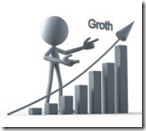The marketing field is filled with jargon, as it seems all would-be sales gurus make up their own set of terms and acronyms to differentiate themselves from the pack. Yet the world of marketing language offers nothing more confusing than those pairs of apparently identical words that actually represent radically different concepts.
Perhaps the two most commonly misunderstood marketing terms are “tactic” and “strategy.” At first glance this pair of words appears to refer to the exact same concept. Yet tactical and strategic marketing approaches are radically different from each other, and if you want to create the greatest success for your organization you need to learn which option produces disproportionately greater results.
The Short Term Focus of Tactical Individuals
 Tactics are momentary actions defined by momentary goals.
Tactics are momentary actions defined by momentary goals.
Most people think tactically, act tactically, and evaluate success according to nothing more than their ability to clear the next hurdle placed in front of them.
A tactical person focuses on the minute-by-minute actions they need to take to achieve a relatively small, short-term goal. A tactical individual is more focused on making a sale than acquiring a lasting client, hitting a quarterly goal instead of working towards fulfilling a 10 year plan for growth, and being incredibly focused on the task at hand, regardless of that task’s perceived importance.
For better and for worse, approximately 90% of all people exhibit tactical natures. Looking on the positive side, tactical people often find themselves well grounded in the day-to-day needs of their organization, and tactical people are often extremely efficient at the work they perform.
Unfortunately, tactical people tend to lack perspective. They have an easy time focusing on getting tasks done, but they rarely stop to ask whether those tasks are really worth completing in the first place. They are great at achieving short-term goals, but they aren’t great at determining whether their achievements support or detract from the long-term goals of their organization. In fact, left to their own devices, tactical people rarely even set long terms goals, as fixated they are on the here-and-now.
Taking the Long View with the Strategic Approach
 Strategies employ a more expansive perspective on an organization’s goals.
Strategies employ a more expansive perspective on an organization’s goals.
About 9% of all people exhibit a strategic nature. Strategically oriented people concern themselves with developing brands, building relationships with their clients, and abiding by the deeper principles of their organization, no matter the momentary consequence. A strategic individual feels more concerned with developing loyalty within a client than maximizing an individual sale. A strategic individual care more about where their organization will be in 10 years than how their organization is poised to perform this month. A strategically oriented employee or boss knows it’s better to perform a meaningful action sloppily than an inconsequential action perfectly.
By taking the long view, strategically oriented people produce bigger, more lasting success than tactically oriented people.
Of course, that doesn’t mean strategic individuals lack faults. Strategists often perform the details of their work far sloppier than tactically oriented people, they are more likely to deal impatiently with small concerns, and they aren’t always able to determine what small, specific actions will lead to their organization’s greater purpose.
Developing Two Sets of Eyes
If you find yourself forced to take either a strategic perspective or a tactical outlook, you will serve yourself and your organization better by valuing long-term considerations over the short-term concerns. But who ever said you needed to choose between being either tactical or strategic?
Only 1% of people combine a strategic view of their work with a tactical understanding of how to best reach their lofty goal. This 1% of the workforce represents those individuals who create the sort of success we all dream about achieving ourselves.
Very, very, very few people are able to naturally hold strategic and tactical philosophies in their head at the same time. The average individual can utilize both approaches, but they will need to learn how to alternate between them.
It’s best to start with a strategic mindset, to chart the course of where you want to go and what you want to accomplish, to create your grand vision of your work, your organization, and even yourself, without entertaining an ounce of consideration related to how exactly you’re going to build this castle-in-the-sky. To successfully engage a strategic mindset, you need to begin by dreaming as large as possible.
Once you’ve discovered a vision worth building, a long term goal that lights a fire under you and will inspire those around you, that vision needs a grounded, tactically based foundation to rest on.
Begin by re-defining your grand vision in measurable terms. This is easier than it sounds. For example, if your vision is to create the world’s top-selling e-book, then concretizing this goal requires nothing more than doing a little research to discover what the current top-selling e-book is, and how many units they sell annually. If the current king of e-books sells 1 million copies a year, then you now you need to sell 1 million and 1 copies a year to achieve your larger goal. You now have a strategic vision that is grounded in the real world, and as such ripe for tactical deconstruction.
Of course, once you create a series of successful e-book selling tactics, you need to sit back and evaluate each of them, asking whether they serve the greater strategic purpose of your organization. Will the tactics you chose create an initial spike in sales that drops off due to the negative press they create? If so, you will quickly see that these short-sighted sales tactics won’t going help you reach your goal of creating the world’s top-selling e-book. Instead, you will realize that a gradual, customer-satisfaction oriented approach is more likely to help you hit the 1 million and 1 mark, even if such tactic’s temporary achievements are less than stellar.
To maximize your success all you need to do is alternate tactical and strategic approaches, making sure each reflects the values of the other, grounding your dreams in reality and only performing those daily actions that live up to the standards set by your greatest goals.








Comments are closed.